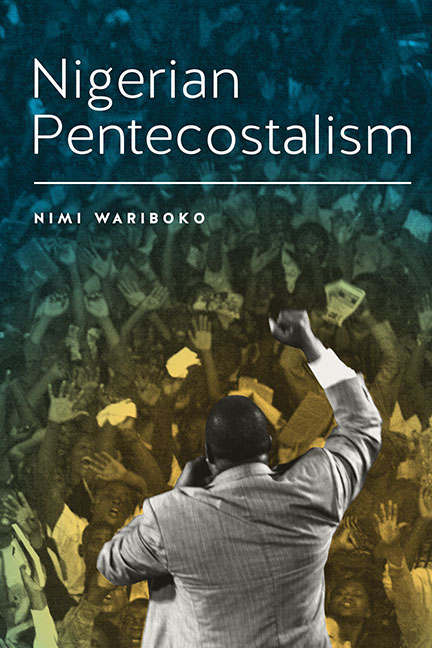Book contents
- Frontmatter
- Dedication
- Contents
- Foreword
- Preface
- Acknowledgments
- Introduction
- Part 1 Origins and Spirituality of Nigerian Pentecostalism
- 1 Sources of Nigerian Pentecostalism
- 2 The Spell of the Invisible
- 3 Excremental Visions in Postcolonial Pentecostalism
- 4 Desire and Disgust: Ways of Being for God
- 5 The Pentecostal Self: From Body to Body Politic
- Part 2 Ethical Vision of Nigerian Pentecostal Spirituality
- Notes
- Bibliography
- Index
1 - Sources of Nigerian Pentecostalism
from Part 1 - Origins and Spirituality of Nigerian Pentecostalism
Published online by Cambridge University Press: 15 March 2018
- Frontmatter
- Dedication
- Contents
- Foreword
- Preface
- Acknowledgments
- Introduction
- Part 1 Origins and Spirituality of Nigerian Pentecostalism
- 1 Sources of Nigerian Pentecostalism
- 2 The Spell of the Invisible
- 3 Excremental Visions in Postcolonial Pentecostalism
- 4 Desire and Disgust: Ways of Being for God
- 5 The Pentecostal Self: From Body to Body Politic
- Part 2 Ethical Vision of Nigerian Pentecostal Spirituality
- Notes
- Bibliography
- Index
Summary
The Igbo people of southern Nigeria say that a man who does not know where the rain met him cannot possibly know where he is going…. The study of the past always has meaning for the present and future. It is always useful to know where the rain met us.
—Ogbu Kalu, African PentecostalismIntroduction
In this chapter I will examine the social-historical sources of Nigerian Pentecostalism, putting forward an argument on the social shaping of faith without saying that the religion lacks creative powers of its own. Pentecostalism emerged through multiple pathways that were mediated through culture, history, religious nationalism, and the economic and political dynamics of the country. Paying particular attention to four influential sources—personalities, cultural historical antecedents, growth, and discourse— I will demonstrate the embeddedness of Pentecostalism in the ethos of time and place that is Nigeria in the last 125 years. If the spirit of God, as experienced by believers, supplies the energy and goal of Pentecostalism, and African culture its strong motive of fluid and transversal interactions between physical and spiritual realms, then social and political factors determine the packaging, presentation, and form required by the deeply braided dynamics of divinity and African humanity.
Thus this chapter offers a form of reflection that places interstructured social analyses at the center of its method. I continue the effort begun in the introduction to portray Nigerian Pentecostal spirituality—especially its religious production of knowledge—as a persistent strategic questioning of the manner in which epistemological differences between the visible and invisible realms are constructed, represented, and sustained in a Christian context.
I stated in the introduction that Nigerian Pentecostalism is under the spell of the invisible. The concern with the domain of the miraculous, the quest for unobstructed access to divine grace as source of power, the notion that the self arises from the interaction between a system of the invisible and the world of the empirical, and the attribution of causality to forces beyond the material, phenomenal realm did not fall from the sky. The perchant for the invisible as an explanatory framework and the character of Pentecostalism in Nigeria are rooted in the indigenous worldview and derive from the history of Nigerians’ response to Christianity going back to at least the nineteenth century.
- Type
- Chapter
- Information
- Nigerian Pentecostalism , pp. 17 - 39Publisher: Boydell & BrewerPrint publication year: 2014

